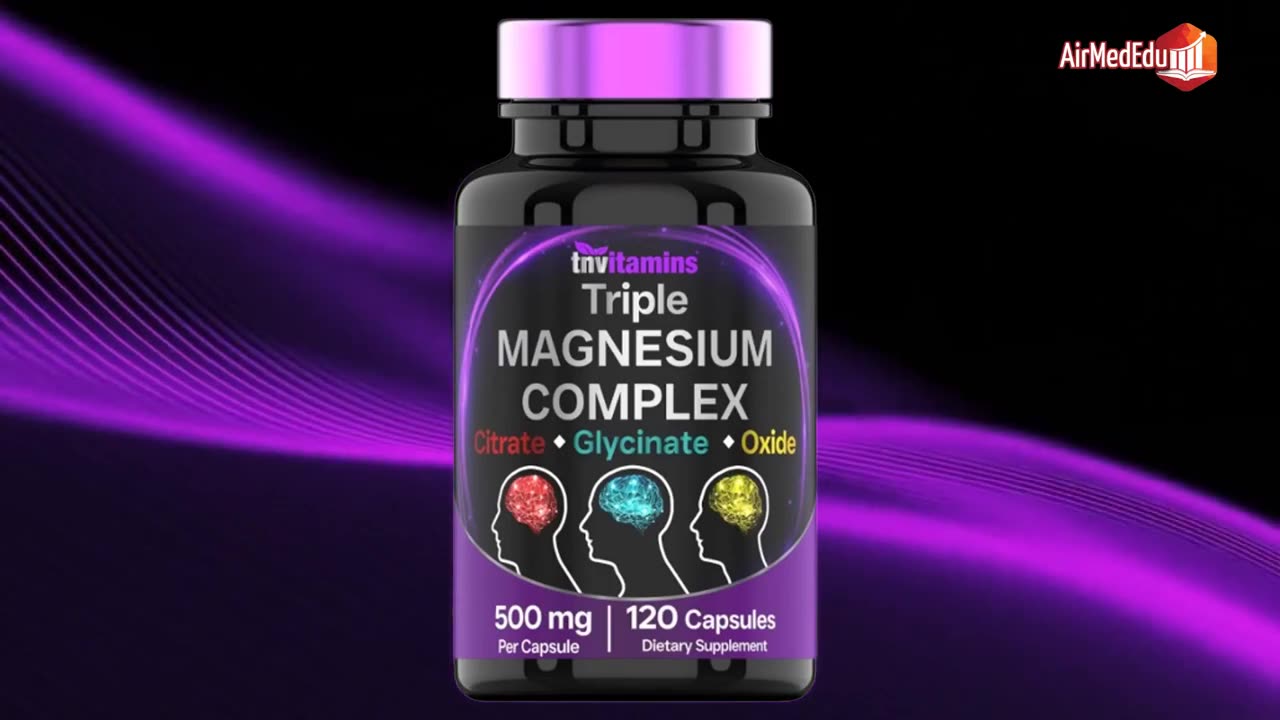Premium Only Content

Magnesium for the Health of Older Adults
As we age, our bodies undergo significant physiological changes that can affect both our quality of life and our overall health. For adults ages 40 to 65 and older, these changes include loss of muscle mass, an increased risk of cardiovascular disease, cognitive decline, and a decline in immune function. In this context, magnesium is positioned as an essential mineral capable of addressing diverse health needs.
Magnesium, a fundamental nutrient involved in over 300 biochemical reactions in the body, is available in several supplemental forms, with citrate, oxide, and glycinate being the most common. Each of these compounds has unique properties that make them especially useful for older adults seeking to improve their physical and mental well-being. Below, we'll explore how these forms of magnesium can benefit specific organs and systems, helping to mitigate the effects of aging while promoting a healthy lifestyle.
We'll analyze key benefits of magnesium grouped into categories such as cardiovascular, cognitive, musculoskeletal, and immune health, among others. This educational approach will allow you to make informed decisions about including this supplement in your daily routine.
Magnesium helps relax blood vessels and improve blood flow, which can be especially helpful for older adults with hypertension. Magnesium citrate, due to its high bioavailability, is particularly effective in this regard.
Magnesium oxide helps stabilize electrical impulses in the heart, reducing the likelihood of arrhythmias, a common problem in older adults.
Magnesium glycinate can help balance LDL and HDL cholesterol levels, reducing the risk of cardiovascular disease.
Magnesium plays a crucial role in nerve signal transmission and brain plasticity. Magnesium citrate and glycinate are ideal options for improving memory and concentration.
Magnesium glycinate has calming properties that can help reduce cortisol levels, promoting better mental health in older adults.
Adequate magnesium levels have been observed to delay the onset of conditions such as dementia and Alzheimer's by protecting brain cells from oxidative damage.
Magnesium oxide is known to relieve muscle cramps, a common problem in older adults due to electrolyte imbalances.
Magnesium is essential for proper calcium absorption, which strengthens bones and reduces the risk of osteoporosis. Magnesium citrate is especially useful due to its high bioavailability.
Magnesium glycinate may help reduce post-exercise muscle soreness by facilitating muscle relaxation.
Magnesium supports immune cell function by reducing chronic inflammation, a common problem in older adults. Citrate is an excellent choice due to its ability to be absorbed quickly.
Magnesium oxide helps maintain a proper balance in serum magnesium levels, which is crucial for fighting bacterial and viral infections.
Magnesium improves insulin sensitivity and regulates blood glucose levels, which can prevent or manage type 2 diabetes. Magnesium glycinate is particularly effective for this purpose.
Magnesium citrate acts as a mild laxative that can relieve constipation, a common problem in older adults.
Glycinate has anti-inflammatory properties that can relieve joint and muscle pain associated with conditions such as arthritis.
Glycinate also contributes to more restful sleep by regulating neurotransmitters such as GABA, which are essential for relaxation.
Magnesium plays a role in hormonal regulation, helping to alleviate symptoms related to hormonal imbalances in postmenopausal women.
Magnesium oxide helps prevent the formation of kidney stones by balancing oxalate levels in the urine.
The recommended dose of magnesium varies according to individual needs, but is generally between 310-420 milligrams daily for older adults. It's important to choose a form that suits your specific needs: Citrate for digestive issues, Oxide for general support, and Glycinate for cognitive and muscular benefits. Although magnesium is available in foods like nuts, seeds, and green vegetables, supplements may be necessary to achieve optimal levels.
Before starting any supplement, consult your doctor to avoid interactions with medications such as diuretics or blood thinners. It's also essential not to exceed the recommended doses to avoid side effects such as diarrhea or abdominal discomfort.
Magnesium, in its citrate, oxide, and glycinate forms, is a powerful ally in addressing the physical and mental challenges associated with aging. From improving cardiovascular health to optimizing cognitive function and strengthening the immune system, this essential mineral offers multiple benefits that can transform your quality of life.
However, no supplement can replace a balanced diet and a healthy lifestyle. Combine adequate magnesium intake with a nutrient-dense diet, regular exercise, and regular medical checkups to maximize its benefits. If you are considering including magnesium in your daily routine, be sure to consult your doctor to determine the best option for you.
-
 LIVE
LIVE
SOLTEKGG
2 hours agoARC RADIDERS "First Month-Anniversary on Rumble"
159 watching -
 2:14:09
2:14:09
LFA TV
20 hours agoRUMBLE RUNDOWN WEEK 6 with JEREMY HERRELL AND SHAWN FARASH 11.15.25 9AM
99.6K7 -
 1:44:16
1:44:16
HotZone
4 hours agoLive: The Hidden Crisis in US Special Ops: What They’re Not Telling You About Women in Combat
1.46K6 -
 LIVE
LIVE
Athlete & Artist Show
18 hours agoBombastic Bets & Games w/ Team Canada Veteran!
75 watching -
 53:13
53:13
X22 Report
3 hours agoMr & Mrs X - It All Revolves Around Marxism, Think Political Correctness, Midterms Are Safe - EP 16
54.1K8 -
 LIVE
LIVE
I_Came_With_Fire_Podcast
9 hours agoThe Right's Drift into Neo-Marxism & America's Populist Crossroads
170 watching -
 LIVE
LIVE
Amarok_X
2 hours ago🟢LIVE 24 HR STREAM? | ARC RAIDERS TO START | OPERATION 100 FOLLOWERS | USAF VET
72 watching -
 LIVE
LIVE
Pepkilla
2 hours agoDay 2 of Camo Grinding Black Ops 7 ~ Until My Brain Rots
84 watching -
 27:34
27:34
marcushouse
4 hours ago $0.59 earnedWOW! I Was NOT Ready For This One… 🤯 | Starship & New Glenn Lead The Race!
2132 -
 LIVE
LIVE
MrR4ger
4 hours agoD4RK and D4RKER TO START THEN ARC R4IDERS W/ TONYGAMING AND AKAGUMO
67 watching